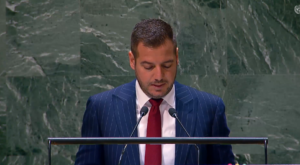Item 73 – “Report of the International Court of Justice”
78th Session of the UNGA, New York, 6 November 2023
Mr. President,
At the outset, allow me, on behalf of my country, Cyprus, to express our sincere gratitude to the President of the Court, Joan E. Donoghue, for the introduction of the report. We also want to thank the President and the judges of the Court, as well as the Registrar and the staff of the Court for their commitment to justice and international law.
Cyprus fully subscribes to the statement of the European Union and would like to add some additional comments.
We welcome the Court’s exceptionally high level of activity during the reporting period, including the issuance of four judgments and twenty orders, the organization of six public hearings, and the seizure of five new contentious cases as well as two requests for advisory opinions.
We further note the broad range of issues before the Court which includes territorial and maritime delimitation, human rights, reparation for internationally wrongful acts, environmental protection, the jurisdictional immunity of States, and the interpretation and application of international treaties and conventions concerning, among other things, the elimination of racial discrimination, the prevention of genocide, the suppression of the financing of terrorism and the prohibition of torture. As the report rightly observes, the geographical scope of cases before the Court and the diversity of their subject matter continue to reflect the universal and general character of the Court’s jurisdiction.
Mr. President,
Cyprus wishes to express its strong support for, as well as its full confidence in, the Court’s functions, as the principal judicial organ of the United Nations, in settling international disputes and providing guidance and clarity on important questions of international law.
In this context, we reiterate our steadfast devotion to the peaceful settlement of disputes—a principle embodied in Articles 2(3) and 33 of the UN Charter. Cyprus has therefore accepted the Court’s compulsory jurisdiction since 1988 under Article 36(2) of the Court’s Statute. We strongly encourage all other Member States to do the same.
Mr. President,
During the reporting period, the Court dealt with matters of exceptional importance to the international community, including two requests for advisory opinions, a process which we consider instrumental in clarifying critical legal questions of international law and which allows wide participation from States.
We note that the Court was once again called upon, as the guardian of the Genocide Convention, to adjudicate a dispute between Ukraine and Russia relating to the interpretation, application, and fulfillment of the Convention on the Prohibition and Punishment of the Crime of Genocide. An unprecedented number of declarations of intervention under Article 63, paragraph 2 of the Court’s Statute were made, including Cyprus.
In both its written and oral statements, Cyprus made clear its position that the scope of Article IX of the Genocide Convention is sufficiently broad to encompass disputes as to whether the Convention has been properly invoked and facts that call the Convention into application have taken place, as well as disputes as to whether the Convention can be relied on as a justification for taking unilateral actions to prevent genocide. As a country that has been a victim of unlawful invasion and occupation, Cyprus stresses that provisions of the Genocide Convention—or any other treaties—cannot be left to the “own appraisals” of any State Party to justify the use of force against other States. To prevent such unilateral appraisals from becoming entirely self-judging, Article IX must be read to empower this Court to review State claims of unilateral power to assess, and to use force to prevent and punish, a perceived genocide.
Furthermore, the Court was the institution to which Armenia turned during Azerbaijan’s nine-month blockade of the Lachin corridor to Nagorno-Karabakh and its eventual military attack on the enclave in September 2023. Cyprus reiterates the importance of the peaceful settlement of disputes on the basis of international law, but it is also compelled to note that this escalation has taken place while the protection of the aforementioned rights is pending before the Court and notwithstanding two bindings orders of the Court seeking to prevent irreparable prejudice to them.
As a concluding remark, Cyprus notes that the election to replace five judges of the Court whose term is expiring will take place in November 2023. In this regard, Cyprus would like to reiterate its objective that the most prominent jurists of the highest merit with international recognition, from all regions of the world and from diverse legal traditions, be selected to serve as judges on the Court.
I thank you for your attention.